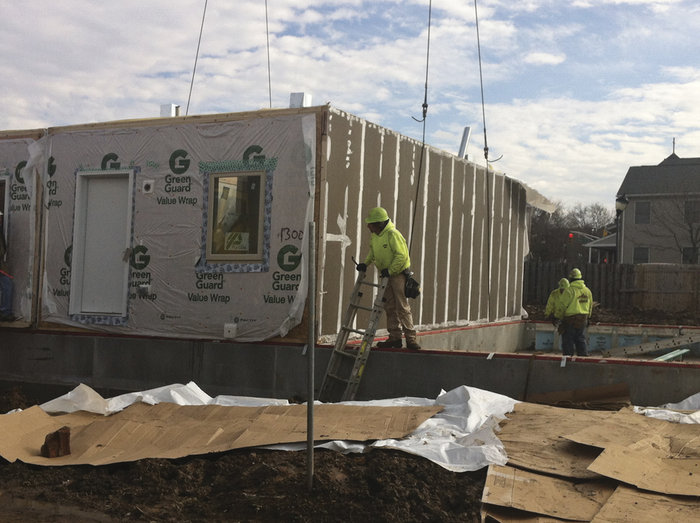Back in the mid-’80s, a group of church leaders had a vision to get more affordable housing built throughout Hudson County for the region’s working class residents. At the time, no one knew it would take more than two decades for these leaders to begin to realize their vision.
“All of the land that we were being offered was, at the time, chromium contaminated and that kind of woke us up to how large that problem was in Hudson County, and in Jersey City specifically,” said Joe Morris an organizer with the Interfaith Community Organization (ICO). “We thought, well, let’s put the housing idea on hold for a couple of years and get the chromium cleaned up, and then go back to the affordable housing plans later. As it turned out, it took about 20 years.”
ICO, an interfaith grassroots organization that formed in 1987, ultimately became one of the leaders in the fight to get chromium contaminated land remediated by the companies that had once owned and operated metal finishing plants throughout Hudson County. With most of these sites now remediated, or currently being remediated, ICO has finally turned its attention to its original goal of increasing the region’s stock of affordable housing.
In one of the first realizations of that vision, the first of 22 modular townhouses were recently delivered to the development that will be known as Jackson Green on Rose Avenue in the Martin Luther King Drive Redevelopment Area, also known as The Hub. The sale price on the three-bedroom, three-story homes will range from $112,000 to about $175,000, depending on the features requested by the homeowners.
‘The Jersey City Planning Board and City Council have approved thousands of housing developments, but none more important than these 22.
____________
So far, one modular home has already been sold and three other potential home-buyers are in the process of applying for a mortgage. Interested homebuyers must earn between 80 to 120 percent of the area median income, which is about $40,000 to $50,000 for a family of four.
“For us, this is a model block and it really represents the progression of different affordable housing and workforce housing projects that we’ve been advancing,” said Robert Antonicello, director of the Jersey City Redevelopment Agency (JCRA). The JCRA owned and donated the land on which Jackson Green is being developed. “Since 2006, the hallmark for the agency was to make sure that the entire city was represented in every project we do.”
Antonicello emphasized that the 22 homes at Jackson Green will be sustainable, income inclusionary, and durable.
‘The difficult art of financing affordable housing’
A partnership between the JCRA, ICO, Honeywell, and The Reinvestment Fund (TRF), a nonprofit developer, Jackson Green will be developed for approximately $7 million.
Along with the donated land from the JCRA, ICO was able to secure a $2.5 million investment from Honeywell, one of the companies that once owned a metal finishing plant in Jersey City.
The rest of the funding for the development is coming from the New Jersey Housing and Mortgage Finance Agency’s CHOICE Program and the federal Department of Housing and Urban Development HOME Program.
Sean Closkey, president of TRF, said the nonprofit tries to “pull the best practices from the for-profit world and the best practices from the non-profit world.”
TRF Development Partners is a non-profit housing affiliate of The Reinvestment Fund and has been able to finance the construction of affordable housing developments throughout the country.
“TRF is great at two things,” said Morris, whose organization has worked with TRF to build affordable housing in Brooklyn. “They’re really great at the difficult art of financing affordable housing, which is harder and harder to do because banks aren’t lending and there are less subsidies than there used to be,” said Morris. “And they’re great at design and building affordable housing that doesn’t look like affordable housing. The reason why we brought TRF to this is because they specialize in this, this is what they do. They are a nonprofit developer. They only do affordable housing.”
Jackson Green is not the first time the nonprofit has worked in Jersey City. TRF has provided financing for the Learning Community Charter School. And in 2005 the organization provided financing for an affordable housing development in the West Bergen neighborhood that saw the construction of 11 new homes. Like Jackson Green, the West Bergen project created affordable housing that was put up for sale. Two years later, in 2007, TRF provided financing that supported the creation of six units of special needs housing in the Greenville area.
Antonicello said the JCRA already has plans to work with TRF on other sites in Jersey City.
“It was very important for us to get TRF to do more than one project,” said Antonicello. “We didn’t want them to come in, do one project, then say, ‘Sayonara.’ We wanted to make sure that when they came in to do this project that they came in to do a project whose scale is much larger. So they are, in fact, going to be working on a lot of lots in and around the Hub that have been vacant for the better part of 20 or 30 years. The Jersey City Planning Board and City Council have approved thousands of housing developments, but none more important than these 22 townhouses…This is a real targeted approach to addressing vacant land the lack of quality housing.”
Construction on the first four Jackson Green townhomes should be completed by April.
To learn more about Jackson Green, visit www.JacksonGreenHomes.com.
E-mail E. Assata Wright at awright@hudsonreporter.com.
